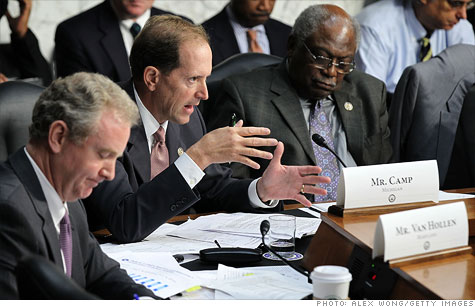Search News

There's only one week left for the deficit reduction super committee to reach a deal, and Wednesday is a critical day for discussion.
WASHINGTON (CNN) -- Wednesday could prove to be the pivotal day for the congressional deficit reduction super committee as it struggles to reach a deal with only one week to go before its statutory deadline.
Rep. Chris Van Hollen of Maryland and Sen. Patty Murray of Washington -- two of the panel's six Democrats -- both described the day as "critical."
"We need to find out about whether our Republican colleagues want to continue to negotiate or whether they've drawn a hard line in the sand," Van Hollen said.
Rep. Jeb Hensarling of Texas, one of panel's six GOP members -- told CNBC Tuesday night that Republicans "have gone as far as we feel we can go" in terms of agreeing to new tax revenues.
"That's the question," Van Hollen told reporters when asked about Hensarling's remarks. "The question is whether they've said take it or leave it and don't want to negotiate."
Murray insisted that Democrats "are not going to accept a plan that gives a tax break to the wealthiest Americans and balances all of this incredible challenge we have on the backs of middle class families."
Republicans have agreed to approximately $250 billion in tax increases over the next decade, according to Hensarling. Democrats insist that is not enough.
At least seven of the panel's 12 members -- evenly split between Democrats and Republicans -- need to agree on savings of at least $1.2 trillion over the next 10 years. If they can do so, Congress will then have one month -- until December 23 -- to vote on the deal.
A failure to pass any agreement would result in $1.2 trillion in automatic across-the-board spending cuts starting in 2013, evenly divided between defense and non-defense spending. Defense Secretary Leon Panetta warned Congress earlier this week that such cuts could cripple the American military establishment.
While Democrats have expressed concern about deep cuts in social spending, programs such as Social Security, Medicaid, food stamps, and veterans' benefits would be spared the budget ax.
Despite the apparent unpopularity of the automatic cuts, it is unclear at best if Congress will be able to find enough middle ground to cobble together an alternative package of savings. Congressional leaders are now weighing in on the process; House Speaker John Boehner, R-Ohio, and Senate Majority Leader Harry Reid, D-Nevada, met behind closed doors Tuesday.
A bipartisan group of congressmen and senators, meanwhile, held a news conference Wednesday morning urging the members of the super committee to "go big" and find a solution that far exceeds the committee's minimum $1.2 trillion goal.
"We must work across the aisle in both houses (of Congress) to get this country on the right track," said Rep. Steny Hoyer of Maryland, the number two Democrat in the House of Representatives. "We have the greatest chance that we've had in a generation to strike a bold agreement."
"The right thing to do is to go big," said Sen. Saxby Chambliss, R-Georgia. "Super committee, we've got your back."
"It's time to go bold. ... It's time to get our nation's fiscal house in order," declared Rep. Jeff Fortenberry, R-Nebraska.
Dick Durbin of Illinois, the Senate's number two Democrat, argued that a more ambitious package that tackles politically sensitive issues such as tax hikes and entitlement reforms might ultimately be easier for the harshly polarized Congress to pass.
"If we stand together and lock arms together, we can achieve something as a group that no individual can achieve," Durbin told reporters. "This is our chance to step up and make a difference."
Super committee Republicans earlier offered a proposal with $1.4 trillion in deficit reduction, including new revenue from capping individual deductions while cutting all six income tax rates by roughly 20%. Under the proposal, the top bracket would fall from 35% to 28%.
Democrats rejected the plan as insufficient, saying it would end up decreasing revenue in the long run by permanently extending tax cuts from the Bush administration that are scheduled to expire at the end of 2012.
Democrats continue to insist that any solution needs to be more balanced among spending cuts, entitlement reforms and increased tax revenue. They also dispute the notion that the GOP blueprint was ever fully flushed out.
"I don't know what the Republican proposal is," Reid claimed Tuesday.
"It's been a long week waiting for a (Democratic) counter-proposal," replied Senate Minority Leader Mitch McConnell, R-Kentucky.
Some members of Congress have proposed making it easier to reach a deal by counting as part of the deal the several hundred billion in savings resulting from an end to the wars in Iraq and Afghanistan. A number of budget analysts have dismissed the idea, however, calling it a gimmick.
--CNN's Ted Barrett, Tom Cohen, Kate Bolduan, Paul Courson, Lisa Desjardins, Xuan Thai, and Deirdre Walsh contributed to this report ![]()
| Overnight Avg Rate | Latest | Change | Last Week |
|---|---|---|---|
| 30 yr fixed | 3.80% | 3.88% | |
| 15 yr fixed | 3.20% | 3.23% | |
| 5/1 ARM | 3.84% | 3.88% | |
| 30 yr refi | 3.82% | 3.93% | |
| 15 yr refi | 3.20% | 3.23% |
Today's featured rates:
| Latest Report | Next Update |
|---|---|
| Home prices | Aug 28 |
| Consumer confidence | Aug 28 |
| GDP | Aug 29 |
| Manufacturing (ISM) | Sept 4 |
| Jobs | Sept 7 |
| Inflation (CPI) | Sept 14 |
| Retail sales | Sept 14 |